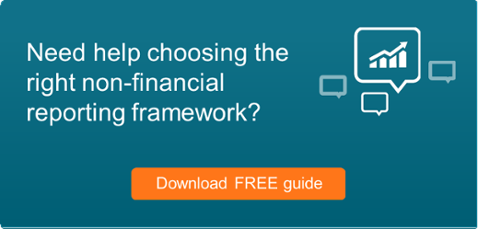Sustainability reporting: the missing piece in the efficiency puzzle
 The following article was recently published by Greenstone's client Sustainable Homes.
The following article was recently published by Greenstone's client Sustainable Homes.
In a world awash with data, choosing the appropriate indicators to measure and monitor makes all the difference in improving business performance. Traditionally, financial metrics have been the single most important tool in measuring an organisation’s and even a country’s success. This has started to change in the last few decades due to growing concerns around environmental and social impacts of businesses. An increasing number of investors now demand data on environmental, social and governance (ESG) performance just as they would request key financial information. [1, 2]
Non-financial reporting has emerged as an alternative to ‘money-focused’ metrics to promote a new kind of growth through transparency in ESG issues. Environmental sustainability and climate related disclosures, which I will refer to as sustainability from here onwards, comprise a major chunk of non-financial reporting frameworks and look at the overall ‘health’ of the organisation from a different angle. This allows sustainability reports to uncover opportunities for efficiency gains which might go unnoticed in financial assessments.
Unlike the financial reporting landscape, sustainability reporting is dynamic and flexible. Since we live and do business in an ever-changing environment, our targets and boundaries are also subject to change and should be carefully assessed. Moreover, sustainability practitioners often discover more interdependencies as they progress on their sustainability journey which can alter the initial assumptions and change the scope of the work at hand.
So how does all this apply to the UK housing sector? Residential buildings are responsible for 20% of total UK emissions [i] and direct emissions have been rising since 2014 despite a reduction in overall national emissions [3]. There is a clear lack of action, and one of the factors at play is the absence of robust sustainability reporting and progress monitoring.
Three questions all landlords need to ask themselves – a good sustainability report will provide the answers
At Sustainable Homes, we have taken the lead on producing a ‘state of the nation’ for UK housing; looking at the progress towards long term, science-based targets [4]. Overall, our findings show that the sector is only 49% sustainable which is a combination of performance in key areas of environmental impacts such as energy efficiency, water efficiency, climate adaptation, responsible sourcing and natural capital. We have also discovered that the social housing sector has not yet managed to decouple carbon emissions from growth. [ii]
Safe as Houses shows that landlords who measure and report sustainability indicators outperform those who do not in most categories. The benefits of reporting are clear but for those looking to undertake sustainability reporting for the first time or review their current practices, complexity can be a barrier – especially not knowing what to measure, how to obtain meaningful data and how to influence senior decision makers to advance the agenda. If this sounds all so familiar, we have a solution to bring real value and provide clarity.
Sustainable Homes are experts in measuring and analysing sustainability performance with data readily available to multi-tenure landlords. Over the years, we have refined our methodology, meaning that we are able to capture all material impacts in a cost and time effective way and provide you with tailored science-based targets. We believe that a good sustainability reporting framework brings the whole organisation into view and should not bring any additional reporting burden.
This is exactly what SHIFT methodology aims to deliver and it can be easily applied to all housing organisations. So if you are interested in finding out more about how to get started with impactful sustainability reporting and seeing how your organisation performs in the metrics discussed in Safe as Houses, then please contact us for a chat.
Contrary to popular belief that sustainability has dropped off the radar, there is a growing movement to accelerate the shift from ‘business as usual’, both at grassroots level and senior business environment. This has been recognised by CCC’s recent report where they highlighted enhanced business reporting and data visibility as a key policy recommendation [3]. Sustainability reporting is here to stay and set to expand its influence. Speak to us to understand how you can prepare and more importantly, make reporting deliver real value to your residents and business.
Sustainability reporting is one of the keynote sessions at ‘Looking ahead: the future of sustainability and housing’ conference on 27 September in Birmingham. See the full programme and book your tickets here.
To read the original article, please visit the Sustainable Homes website.
[1] Barrons, ESG interest surges in Trump era
[2] Sustainable Brands, Investors continue to push for sustainability data
[3] Committee on Climate Change, 2017 Report to Parliament – Meeting carbon budgets: Closing the policy gap
[4] Sustainable Homes, The Review 2016/17: Safe as Houses – Sustainability of the social housing sector
[i] This includes residential share of CO2 from grid electricity, which was 6% of the UK emissions in 2016.
[ii] Titled ‘Safe as Houses’, the report can be downloaded for free here. The underlying methodology is based on the proven SHIFT framework which has been adopted by over 80 housing organisations in the last decade.










